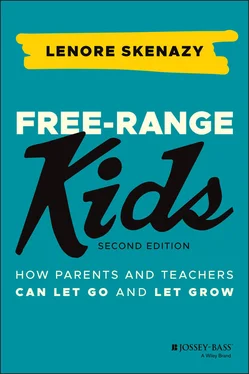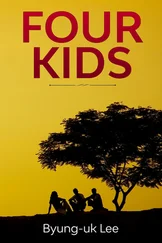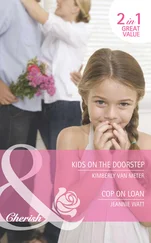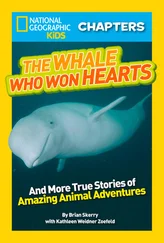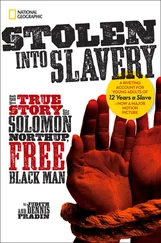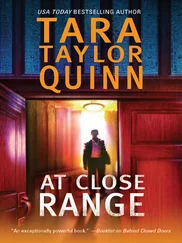If you're looking for answers and don't know where to turn, Barrett says, “Look for credentials.” A book by the American College of Obstetricians, for instance, or a site run by the American Academy of Pediatrics. “I don't recommend that people use Google to search for health advice,” Barrett adds, because so much of what pops up is wacky. “The Internet has made many people more visible. I'm not sure that when it comes to advice, this is helpful.”
I'm not sure, either. That's why Barrett's other suggestion—“Ask your doctor”—seems obvious, but smart. If you have a whole lot of questions, then ask your doctor to recommend a reliable book.
But of course, plenty of parents don't trust any of the old “reliable” sources anymore. They're more ready to believe the ones who say, “Whatever you've heard is fine, isn't.” So sometimes, even if there's reassuring news—such as that the FDA has determined that the chemicals in plastic baby bottles are not going to change your child's sex—it's hard to hear that message because it's the nay-saying “experts” who get the attention and airtime. (Did I mention in the media chapter preceding this one that fear sells?)
Every generation since the 1960s has grown up distrustful of any company or institution that says, “Trust us—you can trust us.” Thanks to Ralph Nader and his cadre of consumer advocates, America learned that car companies were aware of brake problems but hid them from the public, even as cigarette manufacturers knew they were giving us cancer but pretended that they didn't. Thus was automatic skepticism-bordering-on-cynicism born.
But over the years, as we stopped trusting additives and preservatives and pesticides and food coloring and Western medicine and unfiltered tap water and pretty much anything that wasn't an organic turnip in a recycled tote bag from Whole Foods, some of us just threw up our hands and decided it was impossible to trust anything or anyone. (Except Tom Hanks. He tops every trustworthiness poll.) The minute we heard something new and nefarious about a time-honored product or practice, a whole lot of us were ready to embrace it. Shampoo gives you cancer? We knew it!
The Web can confirm these fears—and spawn new ones. Is your water safe? Your cereal? Your sandbox? But as Barrett points out (knowing full well he will sound like just another “establishment” source not to be trusted): most companies really do not try to sell us deadly or defective products. Even if they have no corporate conscience whatsoever, doing wrong is still not worth it to them, because if they harm a single child, they'll have to recall millions of products. Or millions of us will join a class-action suit. Either way, that will hurt their bottom line.
So we have a choice: we can trust the self-proclaimed experts warning us that our body wash is toxic—and by the way, so is everything else—or we can just be glad we're living in a hygienic, regulated society that truly isn't teeming with killer products.
In 1946, Dr. Spock famously began his baby care book with these reassuring words: “Trust yourself. You know more than you think you do.” The mantra of today's experts—“Trust us. There is so much you don't know”—seems designed to drive us mad.
To calm down, remember that the best child-rearing advice boils down to the old basics. Listen to your kids. Love them. Keep them out of oncoming traffic.
And when you're pregnant, don't eat a baloney sandwich in oncoming traffic, either.
REAL WORLD
Baby Magazine Madness
A Free-Ranger who signs herself, “Living in Fear” writes:
I read some “advice” from a baby magazine saying that you should not leave the baby in the house and run out to get the mail—you never know when a fire may start. It's making me crazy.
Free-Range Baby Step: Don't buy any new parenting books unless they have the words “Range” or “Free” somewhere in the title.
Free-Range Brave Step: Immediately stop Googling any and all combinations of the words “toxic,” “childhood,” “should,” “esteem,” “whole grain,” “cover-up,” and “guilt.”
One Giant Leap for Free-Range Kind: Free yourself from advice overload by remembering that we got to this point in human history without the benefit of child-rearing manuals, pregnancy diet books, or potty training treatises. If you seek parenting advice, first try asking an older parent you admire. She'll be thrilled, and her advice won't last 378 pages.
Commandment 4Boycott Baby Knee Pads And the Rest of the Kiddie Safety-Industrial Complex
The jazzy strains of CBS's morning show theme song are coming from the living room. “Parents of any age are about to get something a little extra on Mondays,” promises the pleasant host. “This morning we launch our weekly segment called ‘Parental Guidance,’ with a look at some potential dangers found in almost every home.”
Help for us clueless parents. Hooray.
The show goes live to a Manhattan apartment where James Hirtenstein, a professional babyproofer—yes, it's a real job now—is perched at the top of a steep staircase. He is about to take us on a tour of all the scary parts of this apartment, though I promise you, if you're talking about a duplex in Manhattan, the scariest part is the mortgage. Hirtenstein begins with the stairs, of course, recommending a special kind of gate. Then he goes to the living room, where he recommends little stoppers that keep the doors from shutting all the way, lest they chop off a child's fingers. In the kitchen, he recommends locks on the fridge, lest a child … I'm not quite sure what. Grab a beer? And then he is ready to discuss perhaps the scariest room in the house.
“Bathroom!” he says. “Extremely dangerous.” He's speaking in staccato now, like a Marine. “Toilet lid locks have to be on every toilet in the house!”
“Why?” asks the host.
“ Why? ” the babyproofer replies. “On average two children a week die in toilets.”
Two a week? What a horrible way to go!
Some parents probably didn't even wait for the commercial before sprinting off to call a professional babyproofer. But if they had sprinted off instead to the website run by the U.S. Consumer Product Safety Commission—the federal agency that warns us about everything from recalled baby swings to defective toasters—they could have looked up the actual statistics on death by toilet bowl drowning. And guess what?
“The typical scenario involves a child under three years old falling head first into the toilet,” reads the agency's home drowning study. “CPSC has received reports of sixteen children under age five who drowned in toilets between 1996 and 1999” (the most recent stats they've compiled).
Sixteen children over the course of four years. That's four a year. Not two a week.
Of course, any drowning is a terrible tragedy. And little children do need to be supervised in the bathroom, and never left alone in the tub. It is always a good idea to keep the bathroom door closed for a whole lot of reasons. But the babyproofer's stats were off by a whopping 2600%! Millions of viewers will now be more certain than ever that their children are living in incredible danger.
Which works very nicely, if you happen to be in the biz of selling kid safety products.
This is not to say that all purveyors of these products are out to hoodwink parents. It's not even to say that there aren't some wonderful products out there that really do make children safer, like car seats, which have lowered the chances of a fatal car injury by over 50%. It's just to say that in order to sell literally $94 billion worth of safety products to parents worldwide and make raising a child an extremely pricey—not to mention nerve-racking—proposition, businesses have to convince parents that minor dangers are major. Which is exactly what has happened.
Читать дальше
